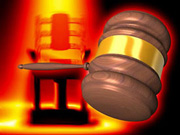|
|
|
Man who sold dogs to Vick pleads guilty
Breaking Legal News |
2007/10/25 04:08
|
| A man who sold Michael Vick two pitbulls for his dogfighting operation pleaded guilty Wednesday in federal court in Richmond to the same charges for which the Falcons quarterback and three co-defendants are awaiting sentencing. Oscar Allen, of Williamsburg, Va., waived indictment and pleaded guilty in U.S. District Court for the Eastern District of Virginia to a criminal information charging him with conspiracy to travel in interstate commerce to aid in illegal gambling and to sponsor a dog in animal fighting. According to court documents, in or about 2001, Allen -- known as "Virginia O" -- bred a litter of puppies for Bad Newz Kennels, the name of Vick's dogfighting operation, for use in animal fighting. One of the puppies was a male pitbull named Magic. In or about 2002 or 2003, Allen also sold Vick and his co-defendants a female pitbull named Jane, according to the documents. Both dogs are mentioned by name in court documents in Vick's case. Allen also acknowledges that he gave members of Bad Newz Kennels, comprised of Vick, Purnell Peace, Quanis Phillips and Tony Taylor, advice on the operation of a dogfighting kennel and attended dogfights at Vick's rural Virginia home, 1915 Moonlight Road, in Surry County. Allen also stated that he was present in April 2007 when Vick, Peace and Phillips tested dogs to determine if they would be good fighters. The dogs that did not test well were executed, but Allen said he was not present. Court documents specifically refer to Bad Newz Kennels and Vick's address, but refer to the co-defendants as M.V., P.P., Q.P. and T.T. Allen, 67, will be sentenced Jan. 25, 2008, in Richmond in front of Judge Henry E. Hudson, who will also sentence Vick and his co-defendants. He faces a maximum sentence of five years in prison and a $250,000 fine. He was released with conditions. Vick and his co-defendants also face state charges in Virginia. Another hearing in that case is scheduled for Nov. 27. In the federal case, Phillips and Peace will be sentenced Nov. 30. Vick will be sentenced on Dec. 10, the same day the Falcons play New Orleans on "Monday Night Football" without the quarterback who has been suspended indefinitely by the NFL. Taylor, the first of the co-defendants to reach a plea agreement, will be sentenced Dec. 14. |
|
|
|
|
|
|
Blackwater accused of tax evasion
Breaking Legal News |
2007/10/23 06:01
|
Blackwater USA, the security company that has come under intense scrutiny on Capitol Hill after a September 16 incident in which it allegedly opened fire on Iraqi civilians and killed 17, was accused on Monday by a senior Democratic lawmaker of evading tens of millions of dollars in federal taxes. Henry Waxman, chairman of the House oversight committee, who is leading congressional investigations into Blackwater, said that a newly discovered March 2007 ruling by the Internal Revenue Service, the tax authority, found that Blackwater's designation of one of its employees as an "independent contractor" was "without merit".Unlike two other security companies operating in Afghanistan and Iraq, Blackwater has said it designates its workers contractors, not employees, because it is a "model that works" and because its guards prefer the "flexibility" of the contractor relationship.
The arrangement has, according to Mr Waxman, wrongly allowed Blackwater to avoid paying social security and Medicare taxes, as well as federal income and unemployment tax - or $32m (£16m) in taxes from May 2006 to March 2007. The IRS ruling was issued after a single security guard approached the tax authority after a dispute over back pay and other compensation. Although the ruling, which is based on Blackwater exercising control over its worker, applied only to the individual, the IRS alerted Blackwater that it could apply to others. Blackwater, which has classified 604 security guards as contractors, agreed a settlement with the employee after the ruling. That included a confidentiality agreement that prohibited the employee from contacting "any politician" or "public official" about its details. "It is deplorable that a company that depends on federal tax dollars for 90 per cent of its business would even contemplate forbidding an employee to report corporate wrongdoing to Congress," Mr Waxman said in a letter to Erik Prince, Blackwater chairman and CEO. He further alleged that the confidentiality agreement was "particularly suspect" because it was signed by Blackwater general counsel Andrew Howell just as Mr Waxman's committee was stepping up its investigation into Blackwater's activities. Blackwater said that Mr Waxman's assertions were "incorrect" and took issue with his use of the IRS decision, against which the company has appealed. The company said the IRS had not made a final determination on the employee and the Small Business Administration had decided Blackwater security contractors were not employees. |
|
|
|
|
|
|
Ford Sued Over Cruise Control Switch
Breaking Legal News |
2007/10/22 12:39
|
| A Virginia man whose pickup truck caught fire last year is suing Ford Motor Co. for damages over a faulty cruise control switch that has led to engine fires and millions of recalled vehicles. Gary Medrano, of Woodbridge, Va., filed the lawsuit on Monday in U.S. District Court for the Southern District of Illinois, saying his 2000 Ford F-150 XLT caught fire in October 2006 because of problems with the cruise control switch. The suit seeks class-action certification. The 10-count complaint does not seek a specific amount of damages, but is asking for both compensatory and punitive damages. The Dearborn, Mich.-based automaker has recalled more than 10 million vehicles since 1999 because of engine fires linked to the cruise control systems in trucks, sport utility vehicles and vans. Ford spokeswoman Kristen Kinley said the company was reviewing the lawsuit, but could not comment on the case. A message seeking comment was left Friday with St. Louis attorney Jeffrey J. Lowe, who is representing Medrano. Medrano said the fire in his pickup truck was extinguished by the fire department, but the vehicle and its contents were left completely unsalvageable. The lawsuit said the National Highway Traffic Safety Administration has reported at least 218 similar fires from the cruise control deactivation switches. By June 2005, NHTSA had confirmed at least 65 fires were caused by the failure of the switch system. |
|
|
|
|
|
|
Capital Punishment at Crossroads in US
Breaking Legal News |
2007/10/22 09:40
|
| Stop executions for a while and perhaps they can be stopped forever. That calculation has been part of the strategy of capital punishment opponents for decades. The Supreme Court-inspired slowdown in executions offers the first nationwide opportunity in 20-plus years to test whether the absence of regularly scheduled executions will lead some states to abandon the death penalty and change public attitudes about capital punishment. Recent decisions by judges and elected officials have made clear that most executions will not proceed until the Supreme Court rules in a challenge by two death row inmates to the lethal injection procedures used by Kentucky. The inmates say Kentucky's method creates the risk of pain severe enough to be cruel and unusual punishment, banned by the Eighth Amendment. Similar procedures are used by Texas, the far-and-away leader in lethal injections, and the 16 other states that have executed prisoners in the past two years. It is clear the high court will not go so far as to outlaw the use of lethal injections. That issue is not even before the court in the Kentucky case. Rather, the justices could decide whether Kentucky's procedures violate the Constitution and what standard the courts should use to evaluate the risk a prisoner will feel pain as he is put to death. No matter how the court rules, it appears there will be few, if any, prisoners executed before the court rules, probably by late June. "We're probably looking at delaying executions, not preventing them," said Ronald Tabak, a New York-based lawyer with the Skadden Arps firm who has represented death row inmates. Tabak said states with the death penalty now have a chance to review capital punishment procedures. The American Bar Association has for the past 10 years called for such a freeze and review. "The ABA's position is unless you have fair practices, executions should not resume," said Tabak, who has worked with the lawyers' organization on this issue. But Douglas Berman, a sentencing expert at the Ohio State University law school, said the possibility exists for more dramatic action. "The abolitionists will say if we have no executions for six months to a year, and the universe is not imploding and murder rates are not going through the roof ... it becomes easier to say, 'Why do we even need the death penalty, let's just get rid of it,'" Berman said. "Texas and other high-execution states aren't going to get there anytime soon, but the argument against capital punishment gets even more force in those states squeamish about the death penalty in the first instance," Berman said. Questions about the administration of lethal injections are only part of the equation. Death-penalty opponents also have pointed to doubts about the competence of some court-appointed defense lawyers and the rise in the number of exonerations through DNA evidence of people already convicted of crimes. Polling has shown that the public increasingly believes that life in prison without parole will keep the worst offenders off the streets. A recent Associated Presss-Ipsos poll that asked what method of punishment people prefer for murderers found only a slight preference for the death penalty over life in prison — 52 percent to 46 percent. "There is a deeper societal appreciation for life without the possibility of parole. Ten to 15 years ago, no one thought they meant it," Berman said. At the same time, there have been several studies, challenged by the anti-death penalty camp, that have shown a deterrent effect in the use of capital punishment. Also, public support for executions remains high. More than two-thirds of those polled favor the death penalty for murderers when the question does not include other possible punishments. Then there is the example of the last time the country went without executions for an extended period. There were no executions from June 1967 to January 1977. The Supreme Court in 1972 struck down 40 state death penalty laws, but did not ban capital punishment as cruel and unusual. Some justices at the time thought their decision in Furman v. Georgia would bring an end to the death penalty. By 1976, though, in the midst of a "law-and-order" backlash to the court's decisions in favor of the rights of criminal defendants, elected officials in 35 states had adopted laws to comply with the death penalty ruling. A more conservative court upheld some of those laws, and a half-year later executions resumed. |
|
|
|
|
|
|
Store bookkeeper pleads not guilty
Breaking Legal News |
2007/10/22 05:45
|
Rebecca McGilp, the Yarmouth bookkeeper accused of embezzling more than $300,000 from a health food store, pleaded not guilty this morning at Cumberland County Superior Court. At the arraignment, McGilp’s lawyer, Peter Rodway, said he will review the facts over the next two months and decide whether his client should seek a plea bargain, or go to trial. McGilp admitted in a statement to police in June that she stole from Royal River Natural Foods in Freeport, where she had worked as a bookkeeper since 2001. The crimes were discovered when the owner of the business Ruth P. Finch, tried to make a withdrawal from an overdrawn account. Finch examined the company’s financial records, and found dozens of checks made out to McGilp, who was normally paid about $150 a week. McGilp stood beside Rodway on Monday and entered the plea of not guilty to Superior Court Justice William Brodrick. She declined comment after the arraignment. She could face up to 10 years in prison if convicted. |
|
|
|
|
|
|
McDonald faces court on trespassing charge
Breaking Legal News |
2007/10/20 09:40
|
A senior official from the Construction, Forestry, Mining and Energy Union has appeared in the Perth Magistrates court to face a charge of trespass. It is alleged the assistant secretary of the union, Joe McDonald, entered the Lakeside Shopping Centre building site at Joondalup in February and refused to leave when asked by site official. The court has heard Mr McDonald had his state and federal tickets to enter building sites revoked in July last year. Today his lawyer argued Mr McDonald was on the site lawfully and left within a reasonable time after he was requested to do so. The Magistrate, Joe Randazzo, reserved his judgement until Thursday so he could consider relevant case law. |
|
|
|
|
|
|
'Lingerer' Asks NYC Court to Drop Case
Breaking Legal News |
2007/10/19 08:53
|
| Standing around to chat on a busy Manhattan street can certainly create an inconvenience for other pedestrians. But is it illegal? A man arrested after a confab with friends in Times Square has asked the state's highest court to dismiss the case. The Court of Appeals heard arguments in Albany Wednesday and could rule next month. Matthew Jones was charged with disorderly conduct and resisting arrest — by flailing his arms — on June 12, 2004. Police said other people "had to walk around" him, and he wouldn't move when asked. The Brooklyn man pleaded guilty to a violation after spending a night in jail, but he later appealed. Courts have upheld his arrest so far. His lawyer, Nancy E. Little, said Wednesday there was no legal justification for arresting Jones for simply standing on the street. "You need something more," she said. "You need to be being verbally abusive, or really blocking lots of people, or lying down on the sidewalk." But assistant Manhattan district attorney Paula Rose-Stark said the disorderly conduct arrest was warranted, noting that Jones' behavior stood out "amid the inevitable hustle and bustle of Times Square." Prosecutors' arguments drew several questions Wednesday from judges — including Chief Judge Judith Kaye, who wondered aloud how bustling Times Square was when Jones was arrested around 2 a.m. |
|
|
|
|
|
|
Class action or a representative action is a form of lawsuit in which a large group of people collectively bring a claim to court and/or in which a class of defendants is being sued. This form of collective lawsuit originated in the United States and is still predominantly a U.S. phenomenon, at least the U.S. variant of it. In the United States federal courts, class actions are governed by Federal Rules of Civil Procedure Rule. Since 1938, many states have adopted rules similar to the FRCP. However, some states like California have civil procedure systems which deviate significantly from the federal rules; the California Codes provide for four separate types of class actions. As a result, there are two separate treatises devoted solely to the complex topic of California class actions. Some states, such as Virginia, do not provide for any class actions, while others, such as New York, limit the types of claims that may be brought as class actions. They can construct your law firm a brand new website and help you redesign your existing law firm site to secure your place in the internet. |
Law Firm Directory
|
|








